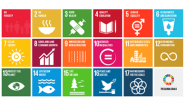Sendai Framework influence on new SDGs
Key references to the recent Third UN World Conference on Disaster Risk Reduction and the Sendai Framework for Disaster Risk Reduction are contained in the draft outcome document that will constitute the new sustainable development agenda, which will be formally adopted by world leaders in New York this September. “Transforming our World: The 2030 Agenda for Sustainable Development” encompasses a universal, transformative and integrated agenda that heralds an historic turning point for our world. This agreement results from a truly open, inclusive and transparent process,” United Nations Secretary-General Ban Ki-moon said in a statement issued yesterday evening.
Concluding a negotiating process that has spanned more than two years with the unprecedented participation of civil society, the 193 Member States agreed to an ambitious agenda that features 17 new sustainable development goals that aim, by 2030, to eradicate extreme poverty, promote prosperity and people's well-being, while protecting the environment.
The document reaffirms the outcomes of all major UN conferences and summits which have laid a solid foundation for sustainable development and have helped to shape the new Agenda. These include the Rio Declaration on Environment and Development; the United Nations Conference on Sustainable Development (“Rio+ 20”) and the outcomes and follow-up to the Third UN World Conference on Disaster Risk Reduction held in Sendai, Japan, in March this year.
The Sendai Framework for Disaster Risk Reduction places strong emphasis on disaster risk management with a view to achieving substantial reductions in disaster losses over the next 15 years. It sets out targets for the post-2015 Development Agenda including a substantial reduction in mortality, in the numbers of people affected by disasters, economic losses and damage to critical infrastructure.
These objectives are re-affirmed under Goal 11: “Make cities and human settlements inclusive, safe, resilient and sustainable” as follows:
“11.5 By 2030, significantly reduce the number of deaths and the number of people affected and substantially decrease the direct economic losses relative to global gross domestic product caused by disasters, including water-related disasters, with a focus on protecting the poor and people in vulnerable situations.”
There is also a specific injunction to make use of the Sendai Framework in achieving this goal:
“11.b By 2020, substantially increase the number of cities and human settlements adopting and implementing integrated policies and plans towards inclusion, resource efficiency, mitigation and adaptation to climate change, resilience to disasters, and develop and implement, in line with the Sendai Framework for Disaster Risk Reduction 2015-2030, holistic disaster risk management at all levels.”
“This is the People's Agenda, a plan of action for ending poverty in all its dimensions, irreversibly, everywhere, and leaving no one behind. It seeks to ensure peace and prosperity, and forge partnerships with people and planet at the core. The integrated, interlinked and indivisible 17 Sustainable Development Goals are the people's goals and demonstrate the scale, universality and ambition of this new Agenda”, stated Mr. Ban.
More than 150 world leaders are expected to attend the Sustainable Development Summit at the UN Headquarters in New York, from 25 to 27 September, to formally adopt the outcome document agreed this weekend. “I look forward to joining Heads of States and Government, civil society, faith and business leaders, and peoples around the world for the adoption of this new agenda in the historic Summit in New York,” added the UN chief.
The new sustainable development agenda builds on the success of the eight Millennium Development Goals (MDGs), which helped more than 700 million people to escape poverty over the past 15 years and aimed at an array of issues that included hunger, disease, gender inequality, and access to water and sanitation by 2015.
The broader sustainability agenda go much further, addressing the root causes of poverty and the universal need for development that works for all people. “We are resolved to free the human race within this generation from the tyranny of poverty and want and to heal and secure our planet for the present and for future generations,” states the text.
Aggiungi un commento
Accedi dalla colonna di destra per aggiungere un commento.


Commenti (0)